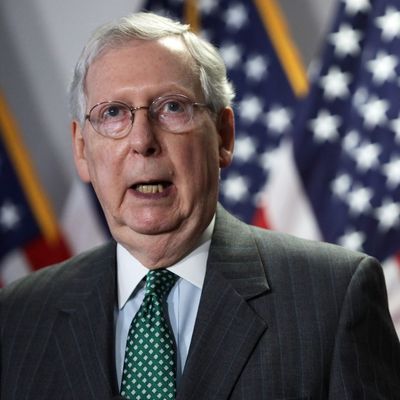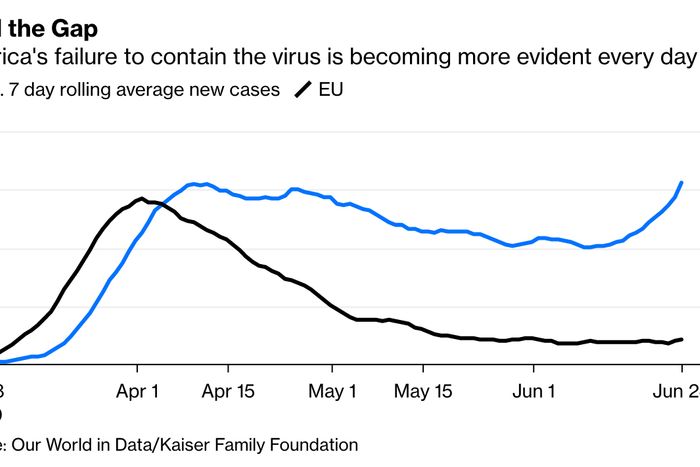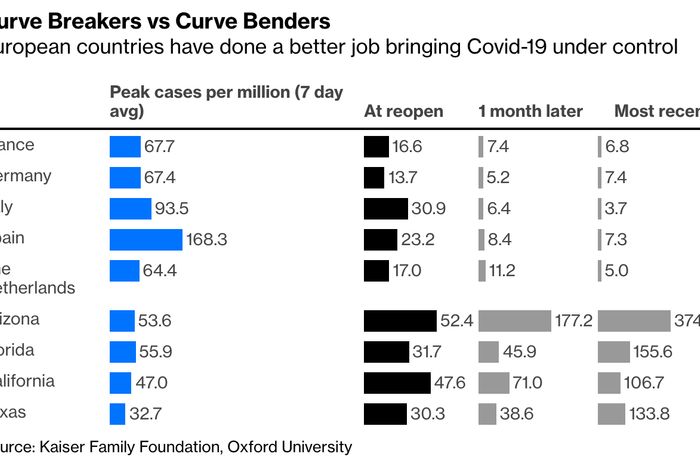
Last Thursday, America’s daily count of new coronavirus cases hit an all-time high. That tally hasn’t dropped below 40,000 in the days since. For the moment, COVID-19 deaths are still declining in the U.S., as new cases have been concentrated among younger Americans. But when a deadly virus is spreading exponentially among a community’s younger residents, it is hard to prevent it from eventually reaching the more vulnerable. As is, the existing outbreaks have yielded enough hospitalizations in Texas, Arizona, and California to strain ICU capacity. Should hospitals become overwhelmed, ventilator triage will commence, and the death rate will rise. Regardless, the present wave of infection has forced various states to either reverse or slow their reopenings, compounding the pandemic’s already catastrophic economic costs.
There are many reasons why the coronavirus pandemic is reaching new heights in the U.S., even as the rest of the developed world reopens for business. But one underappreciated factor is that our ruling party decided to make it fiscally ruinous for states to sustain lockdowns long enough to “crush the curve.”
I’ve written repeatedly about how Senate Republicans’ mindless obstruction of fiscal aid to states and cities is deepening the recession and undermining economic recovery. The short version of that argument is as follows: The U.S. government has the power to print the world’s reserve currency and borrow money at near-zero interest rates. In a noninflationary context, this means that it can engage in vast amounts of deficit spending without any adverse consequences. But state and municipal governments lack this exorbitant privilege. New York cannot print dollars, or get low-cost financing on 30-year bonds. If Uncle Sam prints $1 trillion and uses it to plug state budget gaps, then thousands of public-sector jobs will be saved, countless public investments will be restored, and this will serve to offset the collapse in private-sector demand, thereby accelerating the resumption of economic growth. By contrast, if the federal government denies fiscal aid to states for no good reason — as Senate Republicans have insisted on doing — then those states will be forced to slash public spending and employment, thereby deepening the economic crisis.
Apologists for Mitch McConnell could respond to this argument by arguing that the GOP would of course provide some fiscal relief eventually. The party just wanted to wait for state-level reopenings to commence beforehand, so that they’d have a better idea of exactly how much aid is required (top Republicans have repeatedly used this rationale to justify their foot-dragging on another economic relief package).
This is a poor argument. For one thing, merely delaying relief in the present context is economically damaging. But the bigger flaw lies in the GOP’s rationale for inaction itself: By withholding aid to states, Republicans made it extremely painful for cities to implement responsible public-health policies in the middle of a pandemic.
As Bloomberg’s Max Nisen notes, the key distinction between the U.S. and E.U. approaches to the coronavirus has been the latter’s patience. While most European nations held off on reopening until they had “crushed” the curve, the typical U.S. state lifted lockdown restrictions as soon as they’d bent it: Germany waited until new confirmed cases fell below 14 before they reopened, Arizona reopened when cases were still rising by more than 50 — and deep blue California was scarcely more prudent.
America’s hasty reopening is doubtlessly attributable to a variety of cultural and political factors. But for many U.S. cities, erring on the side of public health — by keeping the economy restricted for a week longer than absolutely necessary — would have meant jeopardizing their capacity to maintain funding for schools and basic social services. Republicans could have empowered state and local officials to make decisions about reopening on the basis of what was best for public health. Instead, they engineered fiscal scarcity that forced states to choose between prudence and solvency. Which may have been the point. The president and his advisers pressured states to reopen quickly, so as to expedite the onset of economic recovery. Instead, our austerity-induced haste has bought us a new wave of outbreaks and a deeper recession.
The least Congressional Republicans can do at this point — for both the country and their own electoral fortunes — is to send $1 trillion to the states before taking their (two-week-long) Independence Day vacation.
































